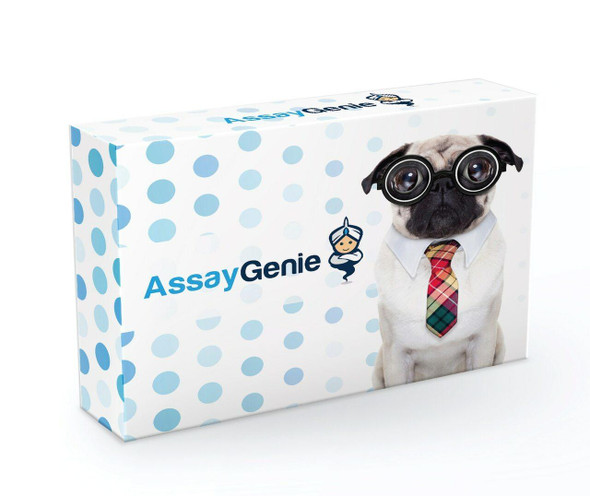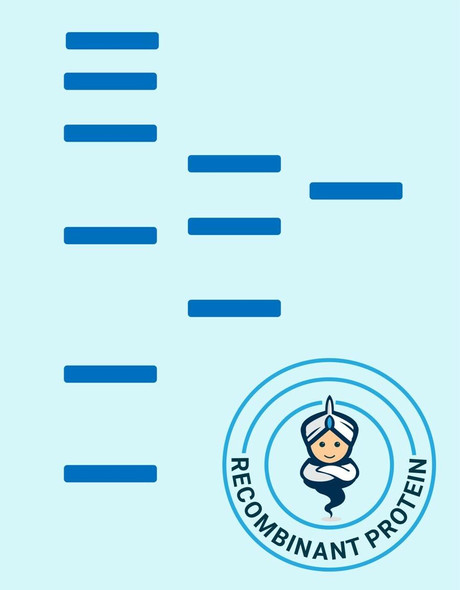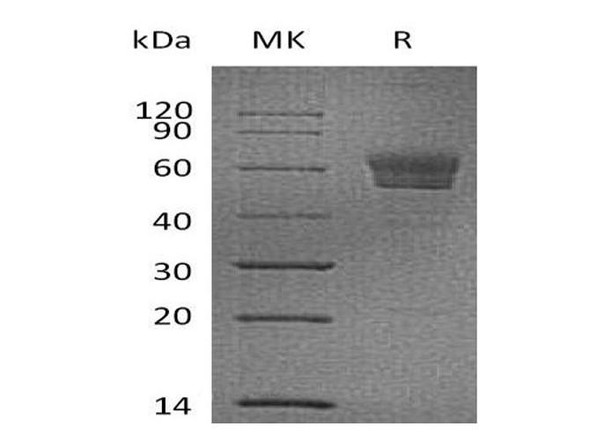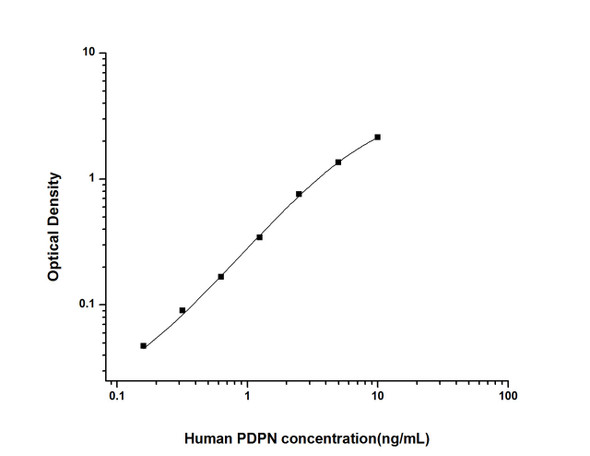Description
PDPN Antibody (PACO20913)
The PDPN Polyclonal Antibody (PAC020913) is a valuable tool for researchers studying podoplanin, a cell surface glycoprotein that plays important roles in cell adhesion, migration, and platelet aggregation. This antibody, produced in rabbits, is highly specific for human samples and has been validated for use in Western blot applications.Podoplanin is well known for its expression in various cancers, including lung, brain, and ovarian cancer, where it is associated with tumor progression and metastasis. Additionally, podoplanin is found in lymphatic endothelial cells and contributes to the formation of lymphatic vessels.
The PDPN Polyclonal Antibody binds specifically to podoplanin, enabling researchers to detect and analyze its expression in a variety of cell types.By studying podoplanin using this antibody, researchers can gain valuable insights into its role in cancer metastasis, lymphatic vessel formation, and other biological processes. This antibody is an essential tool for immunology and cancer research studies aimed at understanding and targeting podoplanin in disease contexts.
| Antibody Name: | PDPN Antibody (PACO20913) |
| Antibody SKU: | PACO20913 |
| Size: | 50ul |
| Host Species: | Rabbit |
| Tested Applications: | ELISA, WB, IHC |
| Recommended Dilutions: | ELISA:1:1000-1:2000, WB:1:200-1:1000, IHC:1:10-1:50 |
| Species Reactivity: | Human |
| Immunogen: | Synthetic peptide of human PDPN |
| Form: | Liquid |
| Storage Buffer: | -20°C, pH7.4 PBS, 0.05% NaN3, 40% Glycerol |
| Purification Method: | Antigen affinity purification |
| Clonality: | Polyclonal |
| Isotype: | IgG |
| Conjugate: | Non-conjugated |
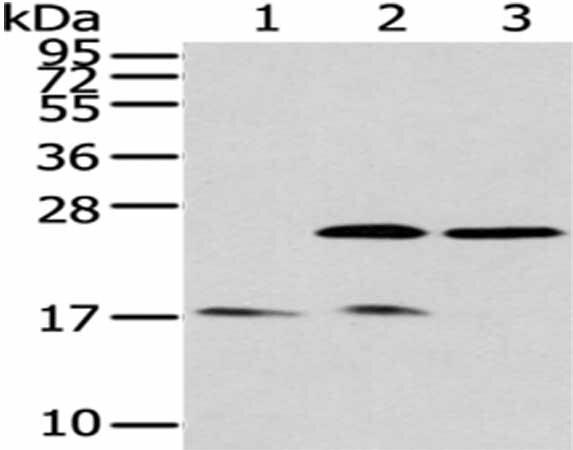 | Gel: 12%SDS-PAGE,Lysate: 40 µg,Lane 1-3: Human fetal brain tissue, Hela cells, 293T cells,Primary antibody: PACO20913(PDPN Antibody) at dilution 1/200 dilution,Secondary antibody: Goat anti rabbit IgG at 1/8000 dilution,Exposure time: 5 minutes. |
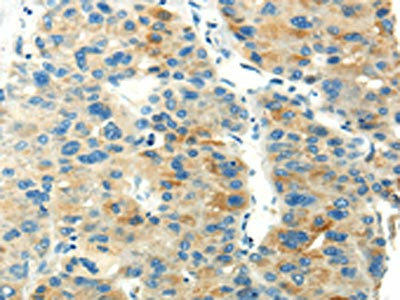 | The image on the left is immunohistochemistry of paraffin-embedded Human liver cancer tissue using PACO20913(PDPN Antibody) at dilution 1/20, on the right is treated with synthetic peptide. (Original magnification: x200). |
| Background: | This gene encodes a type-I integral membrane glycoprotein with diverse distribution in human tissues. The physiological function of this protein may be related to its mucin-type character. The homologous protein in other species has been described as a differentiation antigen and influenza-virus receptor. The specific function of this protein has not been determined but it has been proposed as a marker of lung injury. Alternatively spliced transcript variants encoding different isoforms have been identified. |
| Synonyms: | podoplanin |
| UniProt Protein Function: | PDPN: May be involved in cell migration and/or actin cytoskeleton organization. When expressed in keratinocytes, induces changes in cell morphology with transfected cells showing an elongated shape, numerous membrane protrusions, major reorganization of the actin cytoskeleton, increased motility and decreased cell adhesion. Required for normal lung cell proliferation and alveolus formation at birth. Induces platelet aggregation. Does not have any effect on folic acid or amino acid transport. Does not function as a water channel or as a regulator of aquaporin-type water channels. Belongs to the podoplanin family. 4 isoforms of the human protein are produced by alternative splicing. |
| UniProt Protein Details: | Protein type:Membrane protein, integral Chromosomal Location of Human Ortholog: 1p36.21 Cellular Component: external side of plasma membrane; filopodium; filopodium membrane; integral to plasma membrane; lamellipodium; microvillus membrane; plasma membrane; ruffle Molecular Function:amino acid transmembrane transporter activity; folic acid transporter activity; water channel activity; water transporter activity Biological Process: alveolus development; amino acid transport; cell morphogenesis; cell motility involved in cell locomotion; cell proliferation; cell-cell adhesion; folic acid transport; lung development; lymphangiogenesis; platelet activation; positive regulation of cell motility; prostaglandin metabolic process; regulation of cell shape; signal transduction; water transport |
| NCBI Summary: | This gene encodes a type-I integral membrane glycoprotein with diverse distribution in human tissues. The physiological function of this protein may be related to its mucin-type character. The homologous protein in other species has been described as a differentiation antigen and influenza-virus receptor. The specific function of this protein has not been determined but it has been proposed as a marker of lung injury. Alternatively spliced transcript variants encoding different isoforms have been identified. [provided by RefSeq, Jul 2008] |
| UniProt Code: | Q86YL7 |
| NCBI GenInfo Identifier: | 215274223 |
| NCBI Gene ID: | 10630 |
| NCBI Accession: | Q86YL7.3 |
| UniProt Secondary Accession: | Q86YL7,O60836, O95128, Q7L375, Q8NBQ8, Q8NBR3, A9Z1Y2 B2R6J8, E9PB68, F6QWX5, |
| UniProt Related Accession: | Q86YL7 |
| Molecular Weight: | 12,421 Da |
| NCBI Full Name: | Podoplanin |
| NCBI Synonym Full Names: | podoplanin |
| NCBI Official Symbol: | PDPN |
| NCBI Official Synonym Symbols: | T1A; GP36; GP40; Gp38; OTS8; T1A2; TI1A; T1A-2; AGGRUS; HT1A-1; PA2.26 |
| NCBI Protein Information: | podoplanin |
| UniProt Protein Name: | Podoplanin |
| UniProt Synonym Protein Names: | Aggrus; Glycoprotein 36; Gp36; PA2.26 antigen; T1-alpha; T1A |
| Protein Family: | Podoplanin |
| UniProt Gene Name: | PDPN |
| UniProt Entry Name: | PDPN_HUMAN |
| Secondary Antibody |
| Anti-HRP Goat Anti-Rabbit IgG (H+L) Antibody (CABS014) |
| Recommended Products |
| Anti-FITC Goat Anti-Rabbit IgG (H+L) Antibody (CABS011) |
| Anti-HRP-conjugated Beta Actin Antibody (CABC028) |







